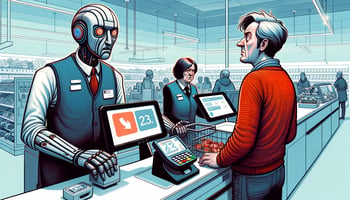5 Things to Say When a Customer Is Furious (But Still Right)

How to stay calm, de-escalate tension, and maintain your dignity (and their loyalty).
There are few things more stressful on a retail shop floor or hotel front desk than a customer who’s absolutely fuming and also happens to be entirely right. The soup was cold. The broadband was down. The gift card didn't work. And they’ve already told five people, tweeted twice, and are now staring you down like a contestant on Gladiators.
This is where many teams fall into one of two traps:
1. Get defensive. ("Well, actually…")
2. Go robotic. ("I'm sorry for the inconvenience...")
Neither works.
What does work? Saying the right thing clearly, calmly, and with empathy in a way that makes the customer feel heard, not handled.
Here are five things your team should be ready to say when a customer is clearly furious but still right.
- “You’re right — we got this wrong.”
It’s remarkable how powerful a straightforward and honest admission can be.
It doesn’t mean you’re personally to blame. It doesn’t mean you’re inviting litigation. It just means you’re acknowledging what the customer already knows: you’ve dropped the ball.
Example: A customer returns to a store with a pair of trousers that still have the security tag on after purchase. She’s irate—and understandably so.
The team member says: “You’re absolutely right — we should have caught that. Let’s fix it now.”
Simple. Human. No corporate jargon. No excuses.
- “I’d feel exactly the same in your shoes.”
This phrase is magic. It shows empathy without patronising. You're not saying, “Calm down” (which never calms anyone down). You’re saying, “Your reaction is valid.”
And when people feel understood, they’re more likely to calm down.
Example: A customer in a café sits at a table for 20 minutes and is completely ignored. Staff are busy, but it’s still a miss.
The manager says: “Honestly, I’d feel exactly the same. If I sat there that long, I’d also be really frustrated. Let’s get this sorted right now.”
Now we’re on the same side. Not the blame game side.
- “Here’s what I can do for you right now.”
The worst thing you can say to an angry customer is, “There’s nothing I can do.”
Even if the policy is limited, you can still take action: explain, apologise, escalate, or demonstrate urgency.
People don’t expect miracles; they expect movement.
Example: A customer is chasing a missing home and DIY store delivery. It was meant to arrive yesterday, but it didn’t. Nobody called or emailed.
The team member says, “Here’s what I can do right now: I’ll call dispatch while you’re here and find out exactly where it is. I'll organise a same-day resend if it’s not on the truck.”
Boom. Specific action = regained trust.
- “That shouldn’t have happened.”
This phrase validates the customer's experience. It's especially useful when you weren’t there, but you still want to show accountability.
It builds trust quickly — especially if the customer feels dismissed elsewhere.
Example: A hotel guest finds their room hasn’t been cleaned after a long day out. The receptionist didn’t cause it; housekeeping missed it.
The response: “You’re right — that shouldn’t have happened. Let me call housekeeping now, and we’ll fix this immediately.”
Short, powerful, and professional, it's much better than “I’ll let them know” (which sounds like a fob-off).
- “I want to make this right.”
Let’s be realistic: sometimes, the problem can’t be undone. The customer’s time is gone. The experience was poor. But what can be salvaged is the relationship.
Saying “I want to make this right” signals intent. It also opens the door for the customer to describe what a meaningful resolution looks like.
Example: A couple celebrating their 10th anniversary had a cold starter and then waited 40 minutes for their main course.
The manager says: “This really isn’t good enough. I want to make this right. Would you allow me to fix it, even if it’s after the fact?”
They comp dessert, offer a voucher, or even just a sincere call the next day. That’s the stuff loyalty is made of.
Final Thoughts: When It’s Bad, Be Brilliant
When things go wrong—and they inevitably will—your team’s language matters more than ever. People don’t remember the temperature of the soup. They remember how they were treated when they complained about it.
Train your team to own the mistake, empathise like a human, and offer something tangible. Customers can tell the difference between a script and sincerity, and they respond accordingly.
Because a furious customer isn’t the enemy, handled well, they’re your most potent word-of-mouth marketing machine.





If you would like an introductory conversation without obligation about how we can assist you in prioritising and implementing business improvements, please get in touch with us at https://www.retailcx.ie/contact.